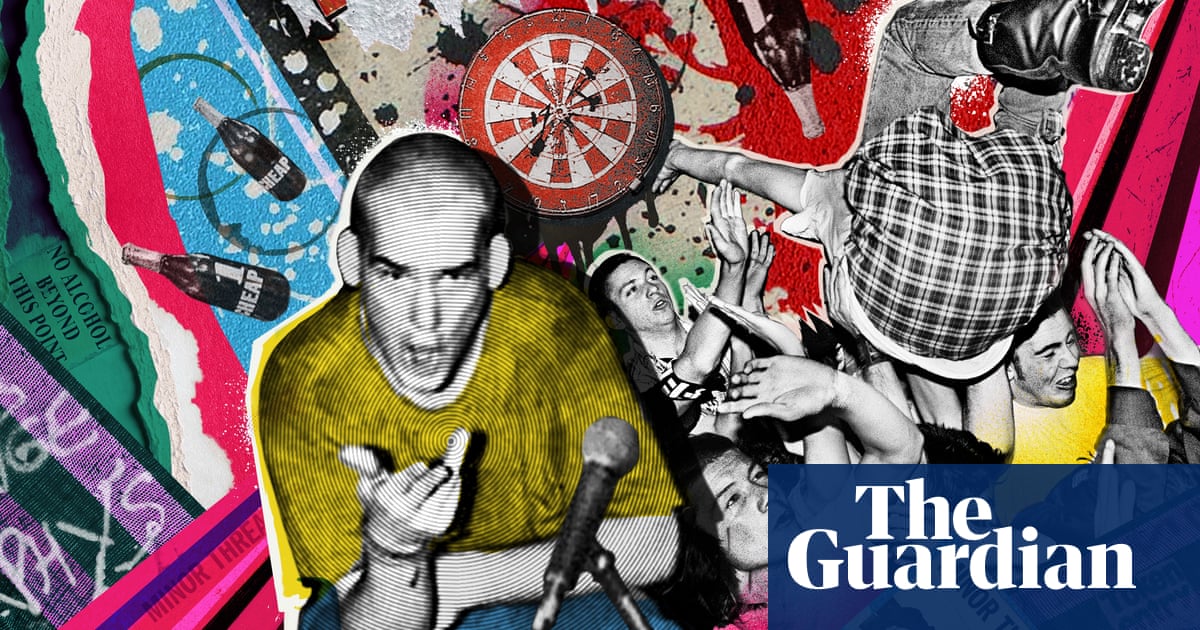Istarted drinking when I was 14. It was how we’d have fun as kids in Aberdeen – I didn’t come across any youth clubs or anything particularly productive. You drank beer or alcopops in some shady lane, and you drank so quickly that you’d get drunk but then be sober enough to get home at 11pm so your parents wouldn’t notice anything. It wasn’t drinking for pleasure: binge drinking was just what everyone – regardless of social groups – seemed to be doing.
During my teenage years I worked at a newsagent and I would read Kerrang! every week, which was extremely formative for me in discovering music. It’s incredible how many new bands I was introduced to, and just how my music taste evolved – from nu-metal bands such as Korn to Rage Against the Machine and, most influentially, Fugazi.
One day in 1999, when I was 16, I read about the hardcore punk band Minor Threat. Ian MacKaye, a member of Fugazi, was an important figure for me: he had a very specific way of approaching music and was fiercely independent. I was inspired by him, shaving my hair and wearing a beanie. A friend even started calling me Bain MacKaye. His previous band, Minor Threat, were active in the early 80s and had been part of what became known as the “straight edge” movement, a subculture of hardcore punks who turned away from drugs and alcohol in reaction to punk’s excesses.
In Minor Threat’s song Out of Step, MacKaye sings lyrics such as “I don’t drink”, but he shortens it to “don’t drink”, so it sounds more like he’s telling you to do the same, which to some degree he is. It wasn’t so much the music itself that grabbed me, it was more that I became interested in this perspective of questioning the mainstream.
I wasn’t particularly rebellious: I didn’t talk back to teachers or have a problem with my parents. So the concept of being straight edge and not taking drugs or drinking seemed like the most radical thing I could do in a middle-class environment.
To begin with, not drinking was just experimental, then it became a challenge. With time, I started to see the good in it. You never know how you’re going to react under stress or grief, and from an early age I had just ruled out drinking as a way to deal with these things. I had also developed an ability to speak my mind or just have the balls to speak to new people sober, not needing something to help ease social anxieties.
I was the odd one out among my friends. They’d wonder why I was doing it and probably made fun of me, but I was never excommunicated from my circle. Still, when I went to university in around 2003, one guy said to me: “You shouldn’t come inside a pub if you’re not ready to drink and smoke in it”. People would often ask me if I was religious or if there were alcohol problems in my family. There always had to be a reason, like it wasn’t a choice to be sober. That’s what was so appealing – it just seemed so radical to be sober. And I have been ever since. It is largely a force of habit nowadays, not the teenage rebellion I felt back then, though I do still listen to Minor Threat from time to time.
Sobriety has given me a very different experience in life. At university I spent a lot of time with foreign students who were slightly older than me.Alcoholwas still a part of their social circle but in a more sophisticated way. That group included the person who became my wife. I now live with her in Finland, where I work as a lab technician. In Finland the phrase straight edge, orstreittari, is well known to describe the lifestyle of those who don’t drink or do drugs, but not many people know its roots – an 80s hardcore punk band.
Did a cultural moment prompt you to make a major life change? Email us at cultural.awakening@theguardian.com
